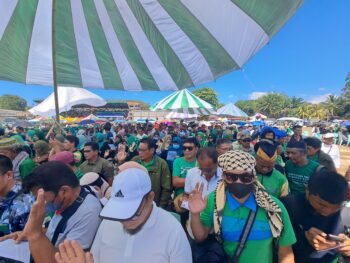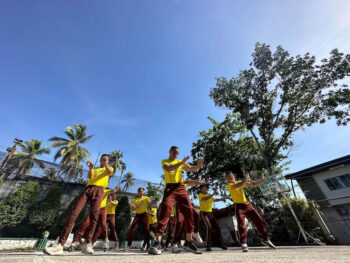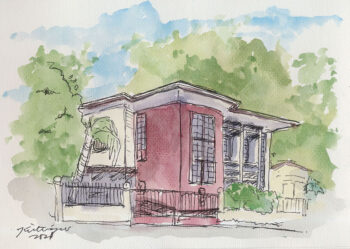MANILA (MindaNews / 01 September) — US president Barack Obama’s favorite TV character on a show called The Wire is a guy called Omar Little who robs drug dealers. He lives by a strict code given to him by his grandmother (with whom he goes to church), yet he is rather a Robin Hood than The Punisher. He is gay – as opposed to modern-day tough guy machismo – and almost poetic in his movements, thoughts and justice. His enemy is the product, the drug, and not the dealer as such. The dealer is both a subject and an object; a subject of morally despicable deeds and a criminal, as well as the object or a chess pawn in the wider game evolving around the drug commodity and the system which grips the entire social fabric of the city of Baltimore, US. Sounds familiar?
Yes, it is fiction, but a very articulated version of a town in decay which has fallen prey to drugs and the endemically corrupt system. The Wire is one of the best treatises on something the world knows as “the war on drugs” because it does not exempt anybody from responsibility. In one of the best scenes of the series, Omar is facing off in the court room with a lawyer of a criminal gang. The lawyer claims Omar is a vampire, feeding off the misery of drug culture and being a thief and a parasitic misfit thriving in a state of fear. Omar cold-heartedly repudiates the claim and argues that it would not matter; in the end, the vigilante and the lawyer are both “in the game,” one uses the shotgun and the other the briefcase.
So if the power to reform and to retaliate against social ills comes from the barrel of a shotgun, why are then people complaining? Or a few naman. Tapos ang international community. Bakit daw?
The part about the lessons
Because The Wire teaches us other things:
1. Wars end. But the war on drugs is a perpetual fight against visible and invisible forces. It is as if Don Quixote is fighting windmills.
2. A war is like a crusade. Corners are getting stormed, body counts are rising. The drug mule and the dealer are enemies. Yet at some point almost everybody at almost every corner becomes the enemy. Statistics, seizures and arrests are all well and nice. But who is protecting the neighbourhood?
But this article is not a story about a TV show or a lawyer’s proof. Granted, shabu may have reached the most remote barangays of the farthest municipalities and caused rifts across families. It is a drug which has been taking over the political economy of vast areas in a slow and creepy fashion. In other parts of the world such as Peru it has been even a catalyst for renewed guerrilla activity. Obviously, conventional war can’t stamp it out.
The part about the war
Yet, I do wonder, where is the Bayanihan? And Pakikisama? Are drug users and dealers completely irredeemable? It seems like it. The transformation of criminals to super-monsters and persons devoid of soul and humanity, sucked in by a big bad drug ghoul, had become an accepted norm as it seems. The first stones are being thrown and thrown and the sinless (most likely, di ba?) henchmen of society, be it vigilantes or the state, are ensuring the aforementioned protection of the barrio or sitio through violence and a rather big stone. Yet Human Rights should not be the shields of those who are ferociously attacking these attackers.
The part about the hypocrisy
The very idea of Human Rights might be an insult to nations which have been exploited for centuries by states from the West, which were and still are pushing for an agenda of implicit colonization and domination of thought. The guardians of the Enlightenment, the illustrados from across the sea are using another modernized tool of the white man’s burden. Di ba?
As the Greek philosopher Costas Douzinas frames it, “when the critique of injustice is formulated in terms of that which begets and supports injustice” human rights will be only tools of oppression, deceit and thievery.
Yes, it does mean that the West was blind to Rwanda, to Bosnia, Syria, Darfur and so many other god-forsaken places. It may lose its political capital and trust and it shook hands with the gravedigger of neoliberalism already. If la noche triste and tropical gothicism are haunting Manila and other shabulized cities, then the world itself may be lying in the shadow of a gigantic eclipse.
Turning again to Douzinas, uncertainty and insecurity about the state of the world we’re in and the crisis of identity affecting both state and individual, the need for moral guidance is paramount. Yet “rules and norms” (habeas corpus? presumption of innocence? Republic Act xyz) may be overburdening and discourage people from finding out their relations to “themselves, others, language and history.”
Back in the centuries, the barrios of the Philippines, especially including Imperial Manila, must have appeared like jewels to the visitor, with the Walled City shielding the cathedrals, churches and boulevards from the outskirts. Yet when the nobles feasted, the locals rotted. The population suffered from this segregation because our shantytowns were bordering rivers and swamps and nature attacked with floods and fires. And the laws of the powerful dictated a division of space where the protected survived whereas the weak just perished.
In the Noli you can see it; the Philippine colony was a parallel universe of Bourbon Spain, a conservative zombie, the nation which according to F Sionil Jose “nurtured Rizal” – yet also martyred him. And this world, across the ocean, is once again striking with force at the Philippines.
The part about the end of human rights
Oo nga, Rodrigo Duterte doesn’t need to listen to the United Nations (UN). In order to make the homeless Filipino at home, he needs to clear up a few things. His vision of bringing reform to a country befallen by war, inequality and social ills is admirable. It is not enough for Western technocrats or ignorant idealists to put “human rights” on paper, hold and wave it to the world and be proud of it.
In one aspect though, I would disagree with Douzinas who proposes that rights are the dissolution of the community. The particular synthesis of law and morality gives our societies meaning. It is not rights-talk which makes us evolve, but it is the naked essence of human rights which help us to find ourselves and grow. This is not based on sheer wish belief. The Philippines has been one of the first Asian democracies. And the particular entity of the confederation of the four principalities/sultanates in Lanao can be considered as an aristocratic Moro polity with democratic shades, ruled by consensus and not mere dictatorship.
The embedded concern of humans for humans did exist in this country for centuries. We may not need legalism or moralism but a more simple prescription: love and mercy.
The part about the crimes
All human rights violations should be having a common starting ground for the discourse. It doesn’t help that certain transgressions are bemoaned whilst others are put in the dustbins of our collective memories. Extrajudicial killings under GMA (Gloria Macapagal-Arroyo) and the various underreported cases in the Aquino administration don’t absolve the current situation from responsibility. And the transgressions of the drug culture and the illicit activities of the drug lords are simple to define. They are crimes, committed by individuals and corporations (of a perverted kind).
The crimes of the state are more difficult to bear; since the state is our protector, it risks more and it should pay attention. Even if the current killings are exclusively (and hypothetically) the works of individuals and vigilantes, the government still has an obligation to protect those who are at the receiving end of punishment.
The part about the fathers
#humanrightshugot. What did Jose Abad Santos write? Kung papipiliin ako sa lalaking matalinung-matalino ngunit walang puso at lalaking punung-puno ang puso ng pag-ibig ngunit walang talino, pipiliin ko ang huli. The logic of reasons and blind rationalism tells to kill. The logic of our soul and psyche advises us a more gentle approach. Father forgive us, for they don’t know what to do. And how many times did the Prophet (S.A.W.) advocate for forgiveness and pardon?
And Jose Rizal? In Mi último adios is describing the essential atmosphere of the country – a sensuous mood, feeling “aroma, light, hues, murmur, song, moanings deep.” But not death. It is a carnival of souls and spices, not of carnage. Through a glass, darkly, it is seen, not as a narco-state. It is the fallen angel or just man, beyond virtue, beyond vice.
The heart, Mr. President. Compassion. Hope. There are many other ways than death. Kill the drugs. Destroy them, find the factories. Reverse the politics of addiction to the poetics of love. Improve the lives of those lost souls without losing your own soul. Burn these factories of hate. But you don’t need to set people on fire. Because when they burn, all of us will. Soon.
(MindaViews is the opinion section of MindaNews. Hasan T. Laponte is the pen name of a development worker who has been working with community organizations in Mindanao and Philippines for a few years and who is based part-time in Manila)







